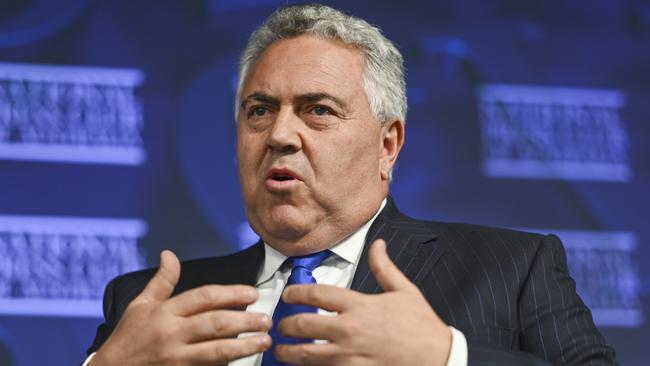Joe Hockey casts doubts on Kamala Harris’s chances of winning the US election
Former ambassador to the US Joe Hockey says Kamala Harris faces significant hurdles, as he also offers to assist Labor in working with Donald Trump should the former president win.

Former treasurer Joe Hockey says that despite Kamala Harris “winning the enthusiasm battle” against Donald Trump since taking over from Joe Biden as the Democratic presidential candidate, she faces significant hurdles to taking office, including having to face inherent racism and misogyny in the US.
Mr Hockey, who was Australia’s ambassador to the US between 2016 and 2020, indicated he would be willing to “step up” and help ensure stable diplomatic ties should there be friction between a Labor government and another Trump administration.
“In my view, it doesn’t matter whether you are Liberal, Labor, Green, whatever. Australia first. And everyone, everyone steps up,” he said in response to questions at the National Press Club over his willingness to go back “behind closed doors” with Mr Trump should he be elected again.
“You never know where the angle will be,” he said.
Mr Hockey, who now runs a Washington-based advisory firm Bondi Partners, said that both Mr Trump’s and Ms Harris’s policy platforms demanded significant spending that could lead to a “rocky time” for global currencies.
“If half of what Donald Trump is promising is implemented, or if what Harris is promising is implemented, America’s economy is going to have substantial and significant structural problems,” he said. However, he added Mr Trump’s policy platform was “absurd in its largesse” and would be “hugely expansionary”.
“(For Mr Trump) it’s like a sugar hit. It’s handing a box of chocolates to a four-year-old,” he said, adding that Mr Trump still had a solid chance of winning the election because he represented the first politician who wasn’t looking down on the average American and promised to fight for them, even against popular opinion and the establishment.
He said even Mr Trump’s apparent missteps, including the false assertion that immigrants were eating neighbourhood cats and dogs, had some positive impacts for the Republican.
“Everyone’s talking about cats and dogs in Springfield, right? What they’re really talking about is immigration,” he said.
“And when your opponents are talking about illegal immigration, you’re on the topic that wins you votes. It’s really absurd.”
He said many people in America and around the world were still trying to understand who Ms Harris was. “So in this presidential election, this is the first ticket since 1980 that hasn’t had a Clinton, a Bush or a Biden on it,” he said.
“And Americans are asking who’s Harris? It remains a mystery and it’s compounded by the fact that the re-elect on Biden was so poor, so Harris had to differentiate herself from Biden, not on policy, but actually on personality. Everybody else has defined her personality and lifted her up, but I think the biggest challenge she has is there is no policy differentiation from Biden.”
Mr Hockey said the global community was also trying to work out “what makes her heart beat in international relations”.
“That’s why she’ll be tested early, because people will be trying to work out what her priorities are,” he said.
And the Vice-President faced an uphill battle when it came to her gender and race.
“She’s also the first woman of colour running and there is still an element in the United States that is both misogynistic and racist.”
On domestic issues, Mr Hockey backed in the need for nuclear energy, which the Dutton-led Coalition has announced as the key pillar to its energy policy.
“I don’t know how we’re going to meet the massive demand for energy over the next few years,” he said. “My view is small nuclear reactors are coming and we’re going to be buying. Whoever’s in government will be buying. Other than that, I don’t want the lights to go out on my kids, my grandkids.”
The Coalition is yet to release its costings on nuclear energy, while Labor has slammed the idea as costly and not realistic. But Mr Hockey said he was unsure how the government would be able to deliver the level of renewables required for future energy needs.
“About 70 per cent of renewable programs are actually located on Indigenous land,” he said.
“And I’m thinking to myself, how on God’s earth are you going to carry the community with you, the Indigenous community, and still deliver the renewables, and still deliver the projects on time and on budget?”




To join the conversation, please log in. Don't have an account? Register
Join the conversation, you are commenting as Logout